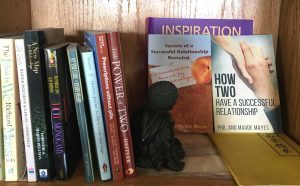Maude Mayes's Blog: Secrets of a Successful Relationship Revealed, page 69
March 20, 2019
Successful Relationships Reading Corner
In this week’s blog, we wrote about the need to balance talking and listening. We didn’t find any discussions about this balance, but here are some good links on active listening.
Active Listening: The Art of Empathetic Conversation “It is time to focus again and practise the skill of mindful listening. Not just because we owe our full attention to others when we converse, but because the positive emotions of a truly good conversation have the potential to make us happy!”
Active Listening: The Master Key to Effective Communication “The sense that we are not being listened to is one of the most frustrating feelings imaginable. Toddlers scream about it, teenagers move out, couples split up, companies breakdown. One of the main reasons this breakdown in communication occurs is that listening (like reading, thinking clearly and focusing) is a skill which we rarely consider to be something requiring knowledge and practice.”
How to Listen and Build Deeper Connections with People “We’ve never had more excuses to not listen. As technology advances and content explodes, we continue to spread our attention across multiple screens, problems, and people — often all at once. As a result, attention has become one of the scarcest resources — and one of the most valuable. People who can truly listen have a unique edge in a world fragmented by distraction.”
March 17, 2019
You Need to Balance Talking and Listening
 There’s more to active listening than usually gets discussed.
There’s more to active listening than usually gets discussed.
We bumped up against this recently, while working on a Secret Project. We were talking, and both of us felt interrupted by the other. We’ve occasionally had this experience of being interrupted by the other person before completing the point we were trying to make. We’ve objected, pushed to complete the idea, then moved on. These events haven’t left scars because we don’t work like that, but we have become sensitive to such interruptions.
Since we know so deeply that we want the same things, and neither of us is interested in combative exchanges, we stopped the discussion and turned our process on the experience we were having instead.
We both understand and practice active listening with each other, so what was going on? What we turned up in our processing are some aspects of active listening and hearing each other, that are not often considered.
There are of course different kinds of exchanges and they call for different behaviors.
Wanting to be Heard
Phil was in a relationship where his partner would tell of her troubles and he would respond with suggestions, but that wasn’t really what was needed. Instead, she wanted to express her feelings, and who wants their feelings to be cut short in the middle? The goal is to be heard, not to get anything fixed or even commented upon. This is a common male-female dynamic, as men see themselves as (or have been cast as) fixers and problem solvers.
When this pattern arises, both people can contribute to fixing it. When listening, be sensitive to the needs of your partner, but as the speaker, be explicit about your needs. Share right up front what you are and aren’t looking for. This saves much frustration and gets you the kind of attention and listening you need.
Brainstorming
This is a jamming session where you are sharing free-flowing ideas, and you both just throw them out (usually writing them down to cull later) with no discussion or reaction. The goal in this type of exchange is to get as many ideas down from both of you as you can, so you have a large creative field from which to further develop something. In this style of sharing there is no real active listening called for (except as it stimulates more ideas) as you are both just adding as many diverse concepts as you can.
Exchanging Ideas
We have written about the importance of active listening – of paying attention to what the other person is saying, rather than working on preparing a response. As we have written, “Actually listen, rather than waiting for the moment when you can talk again about why your opinion is the correct one.”
Although this is ideal, the reality is that responses and ideas come up as the other person is speaking and it can be a considerable effort to both hold on to those thoughts and continue to follow the speaker. We all know what that feels like, and how much less we hear of what our partner says when we are holding on to our thoughts and waiting our turn to speak them.
And yet, how can we avoid this situation? When we are actively seeking solutions, decisions or plans, we are excited. We get ideas from listening that are compelling and important to say. How do we keep the exchange going, and not step out of the important process of hearing our partner, while still being able to share the ideas as they come forth?
Stay connected! Stay aware of each other!
Sound simple? It is once you become aware of it, and yet it is so infrequently practiced. We tend to stay in our own minds when describing a thought or idea. We pay less attention to our partner when we are the speaker. Active listening must have both sides – speaker and listener – aware of each other at all times. Sense if your partner has something to say that fits in, and interrupt your speaking or cut short the length to allow their thoughts to enter. Both parties have to find a balance between expression and reception. Both parties have equal roles in maintaining this balance.
Who cares what the resolution is if you both feel separated or estranged at the end of it? Remain aware that this is a process the two of you are sharing – you are going somewhere together. The most important part of the discussion is the experience you are having together, not the end result. When you have this kind of experience, it is such a delicious pleasure, that it will produce answers born of this closeness.
When practicing active listening, stay connected! Stay aware of each other! #relationships #quote
Click To Tweet
Just the act of staying aware of each other and remaining connected through it all will completely change the dynamic. Remember, have fun with your interactions. After all, the real purpose is to find mutuality, to feel connected, heard, seen and loved.
Notes
1. Cultural differences can play into this. For example, Deborah Tannen writes “many Californians expect shorter pauses than many midwesterners or New Englanders, so in conversations between them, the Californians end up interrupting.” (Her book on language differences is a must-read.)
2. When talking, we (Maude and Phil) usually sit side by side with our forearms touching. It feels as though this way, a significant amount of communication occurs non-verbally.
March 13, 2019
Successful Relationships Reading Corner
In this week’s blog, we asked what lies at the core of successful relationships. Some authors get it! Here are three.
Beware Of Mistaken Marriage Advice That “All Couples Fight” “Stressful situations that are becoming adversarial between loving partners can escalate into ever more stressful arguments. Alternatively, they can be handled with calm, productive, collaborative talking together that dissipates stress and yields creation of mutually comfortable solutions.”
5 Ways To Create More Harmony In Your Relationships “If you want to create more peace in your relationships, it starts with your relationship with yourself. The relationship of your dreams, where there’s authentic connection and you feel loved, accepted, and honored just as you are is completely possible when you realize that it starts with YOU. … Here are a few practices that will help you tame the monkey mind and create more peace, harmony, and connection with yourself and in your relationships.”
5 Top Tips to Enhance Relationships and Find Inner Peace “We all have challenges in our relationships at some time or other. If you are having relationship problems, you wouldn’t be having them if you weren’t having them with yourself. It all starts with you, being at peace with yourself! You cannot expect to have peace with others, never mind even thinking of having a healthy relationship when you have turmoil inside of you.”
March 10, 2019
What Lies at the Core of Successful Relationships
 We write on many aspects of relationships, hoping to offer you new ways that you can put into practice in your relationship. These different ideas all tie together in our underlying principles.
We write on many aspects of relationships, hoping to offer you new ways that you can put into practice in your relationship. These different ideas all tie together in our underlying principles.
Our first book contained one statement illustrated in many ways: simply stated, a relationship without conflict and embedded in peace is possible and we know this because we experience it. If we do, then so can you.
Many people asked for more specifics about how this was possible, so we looked closely at how we acted with each other, and this led to our second book, How Two: Have a Successful Relationship. We were promoting the very radical idea that conflict is not inevitable in a relationship.
We live a conflict-free relationship. It’s been more than a decade now full of peace, love, joy and passion. Friends check in with us every so often: “So you still haven’t had any arguments?” The answer is always “No.”
One of the primary things necessary to have this experience is to believe it is possible. An obstacle to this is the belief that conflict is inevitable within a relationship. This myth has become so insidiously inculcated in today’s culture that most people take it as a normal part of relating. In fact, many relationship experts extol the virtues of arguing and conflict, and praise all the good that will come of embracing and working through these problems.
“Nonsense!” we say to all of this. Open your minds and your hearts to another way. We are living proof that it is possible to love without hardship and difficulty. How Two: Have a Successful Relationship
Peace in the world arises directly from peace within relationships #quote #peace #relationships
Click To Tweet
Since the publication of that book, we have blogged regularly on the components and mechanisms of this type of living together and relating. Our understanding has evolved. We used to talk about conflict-free relationships, but now, instead of looking at our experience in terms of what it is not, we speak about the quality of peace. This change of focus makes clear how much peace is a visceral experience for us, and we’re hoping it will become one for you, too.
We may appear to be writing about couples’ relationships, but it is our firm belief that the ideas apply to all relationships – personal, familial and social. It is clear to us that peace in the world arises directly from peace between people, and we promote it both through the idea and the direct experience. Join us in this endeavor, and we cherish your sharing of your own experiences.
Our Vision Statement
Spreading Peace One Relationship at a Time
Loving peaceful relationships exist. We have one.
Peace is a tangible reality. It can be experienced and spread.
Our vision is to share how people can relate to each other peacefully.
March 6, 2019
Successful Relationships Reading Corner
In this week’s blog, we asked why total honesty is important in your relationship, so here are some writings about that, both personal and general.
10 Benefits of Being Honest “What does honesty have to do with health and wellness? If you’re striving to be the best you can be, honesty has to be at the foundation. Change won’t last if you are trying to be something that you are not. Honesty is the bridge to authenticity and self-compassion. Honesty allows you to set realistic goals. It bolsters your courage and frees you to be your best self.”
Honesty and acceptance “When I woke this morning, the first day of my forty-first year, I thought to myself: going forward there is one idea that will guide me in life, above all others, and that is honesty. Call it what you will – radical honesty, microscopic truth, total transparency, proactive honesty, or just plain ol’ honesty – but don’t underestimate the change that it can bring. It is this one simple idea – honesty – that has had the most profound and lasting impact on my life this last year, and I will choose it again and again.”
Honesty Can Make or Break a Relationship “When you know you can totally trust your mate, it removes a large potential for worry. It also builds your internal security so that you not only feel good about your partner, but you also feel better about life. Having an honest relationship creates a kind of buffer between you and the difficulties of the world. Having a mate you can trust and rely on also makes it easier to take those risks that help us grow.”
Why Authenticity Is the Best Dating Strategy “Is it better to be yourself or play hard to get when dating? Is being yourself attractive and what type of person does being yourself attract? Do we become more emotionally open and available when we are made to feel safe to be our true selves? A series of studies by Josephs, Warach, Goldin, Jonason, Gorman, Kapoor, and Lebron (2019) just published in Personality and Individual Differences answers such questions.”
March 3, 2019
Why is Total Honesty Important in Your Relationship?

Photo by rawpixel on Unsplash
MAUDE: If you truly desire to have a peaceful loving relationship, we advocate total honesty.
You ask how this can be accomplished? There is that age old joke where the woman asks “Am I fat?” and the husband responds “Am I stupid?”
This is not, as you will see, what we are referring to!
Let’s back up a bit and look at what is the basis of total honesty? The answer? Total acceptance! This requires a shared core value to truly accept each other as you are, to respect and treasure the unique nature of your partner, and to support and nurture each other’s growth. At the same time, you know and show each other that you are on the same side and looking for mutuality in decisions and solutions.
That is quite a mouthful to be sure, and we have written much on the setting of these values and goals, as well as ways and means to achieve them. So, let’s take this necessary foundation as existing. If it doesn’t, then do work on these aspects in your relationship.
At the same time, looking at an examination of total honesty can also help you to use similar methods to work on total acceptance. Yes, its one of those interesting circles that may seem like a paradox, or a chicken and egg situation.
One aspect is clear. In order to practice total honesty in your relationship, you need to feel safe and secure. What are we referring to when we refer to total honesty?
Let’s first clear up some of the things it is NOT. It is not spewing forth the total contents of your mind at your partner. It is not an accusation fest, where you settle blame for what you are feeling on your partner. It’s not sharing a long list of what your partner should do and can change to make you happy in the relationship.
Total honesty arises from working on yourself. You have to know yourself in order to share that with your mate. It starts by recognizing that what you’re feeling is about you and should not to be projected on the other person. You must come to understand that resolving conflicts is not about changing the other person, but rather looking at what the resistance on your side is about. The more information you glean about yourself, and what you are feeling and why, the closer you will come to being able to communicate with total honesty.
If you are going to share your needs and feelings with total honesty, you have to know what they are. You have to own them as yours. Look at what is at play when you don’t share what is happening with you. Are you afraid, and if so, of what?
Someone wrote us recently complaining bitterly that her partner ignored her and didn’t speak to her about really important things. She felt his behavior was abuse in that it did not take her wants and needs into consideration. He seemed to go about his business without including her in his decisions and actions.
The first question we asked her was whether or not she had looked inside and asked herself the questions about what she truly wants and how that relates to her partner? Has she really spent the time and self-reflection to get those answers? The companion question is have you communicated this to him? And equally important, have you communicated this in terms of what you are feeling and want or need, without relaying it as if it is about him, what he is or isn’t doing, or is to blame for?
In reality, this is a spiritual question, and an area that provides a wonderful opportunity for both partners to nurture each other. Our responses to others can lead us to the deepest understandings of ourselves and what areas we want to work on within ourselves.
When you approach total honesty as the sharing of your heart’s desires, and you then share those understandings with your partner, you give them a great gift. They do not have to guess or read your mind to know where you are coming from. They can rest easy in the knowledge that you will speak to them of yourself and give them the opportunity to offer you their love.
Total honesty brings a deep sense of peace and well-being with it. Be brave. Trust your partner. Venture into the world of open, honest sharing. You will grow closer and grow further than you can imagine!
Resolving conflicts isn’t about changing the other person but looking at the resistance on your side
Click To Tweet
PHIL: One of the difficulties in writing about relationships is that everything is connected to everything else, so in writing about a topic, the choice is to either ignore those connections, leaving the subject floating without context, or to haul in the kitchen sink.
Today, we’re writing about total honesty: why it is good, why it is difficult, and what is needed for it to be possible.
Lies, big or small, even white lies, destroy trust in a relationship. If what you hear might be wrong, shaded or incomplete, you start filling in the parts you think are missing and reacting accordingly.
Easy to say, but not so easy to do. One hurdle is embarrassment at appearing weak or stupid. Maybe we fear being seen as unfriendly or vicious or any of a hundred other undesirable lights. Then there is the fear that one of the consequences of honesty might be reprisal.
There are grounds that help total honesty grow and thrive. One is total acceptance, about which we have written elsewhere. When you are totally accepted, what reason is there to lie? To instead tell the truth as it is for you in the moment is to show yourself, to be present, to offer yourself completely to your partner. This is a great gift to grant them.
Another important ground is commitment. In a committed relationship, lies serve no purpose; on the contrary, they weaken and destroy it. A committed relationship itself grows out of knowing and trusting another person, mixed in with joy, admiration and Netflix choices.
So now we have come full circle. It takes honesty to create trust to create commitment to create the space where honesty can thrive.
February 27, 2019
Successful Relationships Reading Corner
In this week’s blog, we wrote about how to balance structure and flow in your relationship. Here are two articles that make a good case for being flexible in your life and relationships, and one about how to set joint goals.
Why We Should All Give Up On Goals Already “To be successful or fulfilled, we all know you need to have specific goals. To achieve them, you should visualise, plan your steps there and attach deadlines and incentives. Work hard, even if you hate the work. And never stray from the path. But that outlook, say a growing number of academic researchers, career coaches and thought leaders, isn’t only flawed; it may also, ironically, be keeping us from success.”
Optimize your life for productivity and flexibility “I’m talking about flexibility of course, and in this article I will focus on how to develop and keep flexibility in personal life as the ultimate competitive advantage. If you aren’t flexible by nature, this article is a must read. Think about what happened to the dinosaurs only because they weren’t flexible enough.”
The guide to relationship goal setting “When it comes to New Year goals and your relationship there are two considerations. Firstly, setting personal goals often involves considering your romantic partner and whether your goal is going to require any involvement or support from them. Secondly, it can be worthwhile to use the New Year period to set some shared goals as well. Here are some tips for discussing and setting goals as a couple.”
February 24, 2019
How to Balance Structure and Flow in Your Relationship
 Both life and relationships need a balance between planning and going with the flow. This is an important part of our lives and the lives of our relationships. Yet how do we do both at the same time?
Both life and relationships need a balance between planning and going with the flow. This is an important part of our lives and the lives of our relationships. Yet how do we do both at the same time?
People differ in the degree to which they are open to new experiences. (It’s one of the Big Five personality traits.) You might see it as an unalloyed good, but stop and think: change without limit is disintegration. Fluidity is great, but a bucket of water only retains its shape because of the bucket. Too much openness can be dangerous. Climbing Everest or trying heroin is risky. Structure, the opposite of openness, is also needed for stability.
It’s easy to picture how this might be a problem in a relationship. One person is free and easy, and wants to accept the last-minute offer of a weekend at a cabin; the other had a household project planned, and the car needs an oil change, and the gas and meals would bust the budget.
This doesn’t need to be a problem. Instead of seeing this as a clash of personality differences, think of it as a situation where each can learn from the other. The systematic person can accept the invitation to loosen up, be free and take more pleasure in life; the chronically disorganized can learn where the ice-chest lives and how to fit the trip into the budget.
To be open to each other requires communication and empathy. When you can state your needs and hear where the other person is coming from, the odds are good that there’s a solution that works for both of you.
Both life and relationships need a balance between planning and going with the flow #relationships
Click To Tweet
In our relationship, openness and flexibility are made possible by an underlying framework of commitment, communication and presence. By offering these to each other, we create the security that allows so many possibilities to exist.
We think it is important to celebrate every day and to be aware of the love your relationship brings into your life. We believe in “merry unbirthdays” just like the Mad Hatter, and we do celebrate each other in many small ways all the time.
It is also lovely to take some of the milestones like anniversaries to reflect and set intentions. Today is the 14th anniversary of our meeting and we’re headed to an Airbnb near Ojai for a couple of nights. In keeping with the sense of stepping out of the flow of everyday life, we usually look back on the year and forward at what might come.
We have several new elements that have entered our lives. An important one that has come with Maude’s leaving her very full-time job is that we have more opportunity to structure our time together.
As part of this shift, we have more time for activities involved with sharing our vision of spreading peace one relationship at a time. We’re excited about our coming launch of the audio of How Two: Have a Successful Relationship, we’re planning to produce more videos, and are looking at scheduling presentations locally and in new venues.
With this opportunity of going off for several days alone together, away from our everyday actions, we will be asking ourselves “What is going to be new for us about this year of our travels together?” and “What are we going to do with it?” We’re looking forward to cuddling up with these questions and exploring what changes are here or coming, and what we want to make of them.
All of these things take a certain level of being able to respond to change with flexibility while still holding to your goals. This is another one of those paradoxes that present opportunities for acting together to find mutual solutions.
When you are faced with situations where you need to bring these two paradoxical elements into balance, use Our Process for reaching mutual solutions, and find your unique creative answers to being flexible and going with the flow, while at the same time embedding your intentions and desires into the plan of action.
When you can make this process a celebration of your mutuality, and create plans which remain flexible and open, you will be filled with a sense of peace and well-being that is unsurpassed.
February 20, 2019
Successful Relationships Reading Corner
In this week’s blog, we wrote about how truth transforms arguments in your relationship. Here are some articles that cover this from various viewpoints.
How Secrets and Lies Destroy Relationships “…in an intimate relationship, emotional honesty includes allowing our partner to know who we are. Honesty is more than simply not lying. Deception includes making ambiguous or vague statements, telling half-truths, manipulating information through emphasis, exaggeration, or minimization, and withholding feelings or information that is important to someone who has a right to know, because it affects the relationship and deprives that person of freedom of choice and informed action.”
The 1 Question That Can Save Your Relationship “Sometimes fights with your partner are about core issues in the relationship that need to be hashed out, and these types of arguments can be productive. But other times fights are the result of people trying desperately to get their point across, while failing to understand the other person’s point. These types of fights are far less productive. Luckily, there’s one question that can shift the dynamic of these fights almost instantly. That question is… ‘What do you need from me?'”
9 Steps to Better Communication Today “Relationships don’t exist in a vacuum. They exist between two emotional human beings who bring their own past experiences, history, and expectations into it. Two different people also have different levels of skill when it comes to communication. But better communication, because it is a skill, can also be learned.”
February 17, 2019
Truth Will Transform the Arguments in Your Relationship
 Maude offered to watch the grand-kids for a week, taking her away from the house except for school hours. The day before she was leaving, we were edgy with each other.
Maude offered to watch the grand-kids for a week, taking her away from the house except for school hours. The day before she was leaving, we were edgy with each other.
Don’t ask what it was about. I think it was my fault, feeling our usual life was being disrupted, eager to get space for writing, annoyed at having to make a series of decisions – who knows? It wasn’t clear at the time, and the reasons are already fading.
I’ve experienced this over and over in my life – that my recollections of arguments include emotions, actions, location, but rarely the subject. Once, with someone else, I was on the beach in sunlight. There was a big rock, and I was crying. Another person, another time: she stormed out of the house and threw the main breakers for spite as she left. But what were these arguments about? Years later, I have no idea; just their emotional marks and images remain. But I digress.
So during the week, Maude and I sat on the couch and talked for more than an hour about what had transpired, digging into the roots of it, looking for who and what and why. Our desire to share what is happening with each other and to be sure there are no confusions, or any distancing caused by things unspoken, is paramount. It’s really important to understand that this wasn’t an argument. It wasn’t remotely close to an argument for several reasons.
Arguments are auto-immune diseases of a relationship #quote #relationships #marriage
Click To Tweet
One, we’re on the same side. We have a strong sense of us as a tangible thing. To truly argue would be to deny its existence, to step out alone into the world.
The second thing is that neither of us enjoys arguments. It’s not avoidance, it’s that we choose not to act that way. And of course, there is also the fact that neither of us is interested in being right. We are about knowing how each of us feels and sharing our truths all the time.
We’ve both been in other relationships with those 16-hour arguments of screaming and crying and despair that finally end with the truth being spoken without any shading, and the reality of the situation made clear to both parties. The storm moves through like a slow-motion tornado, leaving wreckage everywhere and the foundations exposed. Such scenes are not necessary. Far better to start with the truth and avoid them altogether.
Some people have arguments because they’re not a couple, they’re two separated people, or because there is something familiar (in several senses of the word) about conflict. Maybe they grew up being told how useless they were, and so to return to that, they act useless until their partner explodes at how useless they are being, or, or…
Of course, there may be times when you run into a major problem. One of you wants another child. One of you gets yet another transfer across the country. Decisions like these are tough because they’re not a deal-breaking character flaw like philandering or fraud. They come at a cost for one of the partners, yet much else in the relationship is still attractive. We don’t have advice for such situations except to sympathize and say that that they are still not grounds for argument. Dig deep and find your truth.
So the bottom line is if you don’t want to have arguments, don’t have them. If your partner is not able to do this and gets upset, let them, listen to them, have sympathy and compassion, but don’t get swept up in their storm. There is a Polish expression about this: not my circus, not my monkeys.
Arguments are auto-immune diseases of the relationship, but there is a cure. Don’t carry things, holding them in and letting them build up. Talk with your partner, share your feelings. Use “I” when you express yourself so that it doesn’t come out like blame. Speak the truth and hear the truth.
Secrets of a Successful Relationship Revealed
We use this blog to continue the exploration of the magic that can be found in a relationship, and the wider implications of peace for the world. ...more
- Maude Mayes's profile
- 8 followers




